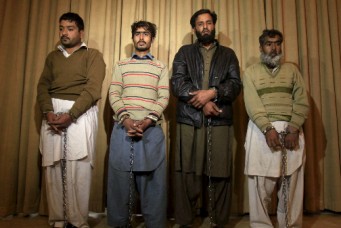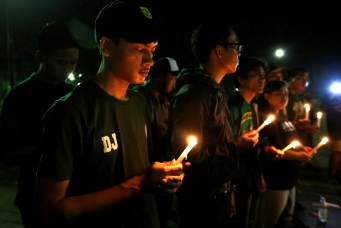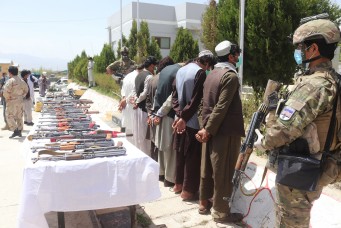The Problem with Radicalism
It is commonplace to associate violent extremism with Islam, but terrorist organizations from recent history show that radicalism is not explained by religion. The concept of relative deprivation is key to understanding the roots of terrorism.

Ultras football fans demonstrating against the Egyptian government, Cairo, May 23, 2015. Anadolu Agency.
What are the root causes of radicalism? Admittedly, this is a very broad question. Yet, it requires serious thinking if we really want to understand why so many young people from diverse backgrounds become extremists and join violent movements. Today organizations associated with political Islam, such as Al-Qaeda, the Islamic State in Iraq and Syria (ISIS), Hamas, and Hezbollah, have become a focus for such discussions. Yet, world history is full of different flavors of extremism and radicalism not necessarily related to religion. With organizations from the not-so-distant past like the Red Brigades in Italy, the Baader-Meinhof group in Germany, and the Irish Republican Army in Britain, ideological and ethnic terrorism with secular roots is not an alien concept to the West. Investigations into what causes radicalization and who joins terrorist groups should therefore go well beyond political Islam and improve our understanding of conditions that lead to extremist violence.
The question about the root causes of radicalism has generated a very polarized and so far inconclusive debate. Generally speaking, two major views have emerged. In one camp, there are those who see ideology, culture, and religion as the main drivers of radicalization. In the opposing camp, social and economic factors such as lack of education, unemployment, and absence of upward mobility trump other causes. The correlation between deprivation and radicalism is strongly rejected by the first group focusing on ideology for a simple reason: most terrorists are neither poor nor uneducated. In fact, the majority of terrorists seem to come from middle class and ordinary backgrounds. Terrorism is therefore almost exclusively perceived as a “security threat” with no discernible socioeconomic roots or links to deprivation. As a result, while the second group wants to prioritize development, education, and good governance to struggle against radicalism, the first group defines the fight against terrorism as a security issue with a single-minded focus on ideology.
Both camps make valid points with major implications for policymakers. Yet, attempts to create a single typology of terrorism or generic profiles for terrorists are not helpful. Radicalization is too complex of a phenomenon and it has multiple causes. An ideal breeding ground for recruitment emerges when various social, cultural, economic, political, and psychological factors come together. Dismissing the economic and social roots of radicalization on the grounds that most terrorists have middle class backgrounds is simplistic and misleading. It is equally wrong, however, to argue that ideology, culture, and religion play no role in the radicalization process.
The key to understanding who joins violent movements is to go beyond social and economic factors or pure ideology. The challenge is to see the interaction between cultural and economic factors without focusing exclusively on ideology or development. In other words, instead of cultural or economic determinism, we have to avoid deterministic, mono-causal explanations and focus on how ideological and socioeconomic factors interact. Only by adopting such an inclusive methodology can the two camps find common ground and come up with more effective prescriptions for policymakers in the fight against radicalism.
The place to start is to accept that ideology becomes much more important when socioeconomic aspirations are on the rise. This is why the concept of relative deprivation—rather than absolute deprivation—deserves more attention. Unlike absolute socioeconomic deprivation, which looks at the consequences of abject poverty or absence of formal education, relative deprivation is all about aspirations and expectations relative to opportunities. Relative deprivation is a growing problem in a world where aspirations and expectations remain unfulfilled and therefore contribute to a process of individual or collective radicalization.
As a conceptual tool, relative deprivation is useful in bridging the gap between the diverging camps concerned about socioeconomic factors versus ideological ones in the radicalization process. As the gap between expectations, opportunities, and accomplishments widens so does the possibility for ideological radicalization. It is precisely when people develop high expectations, aspirations, and hopes for upward mobility that we have to pay more attention to the potential for frustration, humiliation, and ideological radicalization. In addition to studies focusing on how rising expectations may cause revolutions, there is a growing body of literature that looks at “frustrated achievers” with high ambitions and high levels of individual dissatisfaction.
Dismissing the importance of socioeconomic factors as potential drivers of radicalization can therefore be a faulty approach in the context of developing societies. Improving educational standards without increasing prospects for employment, or providing jobs and economic benefits without creating outlets for political and social participation, create a combustible environment where frustrated achievers are increasingly tempted by radicalism. Education without employment, or employment without a sense of political empowerment, fuel the dynamics of humiliation, alienation, and frustration. This is why the growing numbers of educated but unemployed youth are particularly alarming for those who are concerned about the rise of frustrated achievers in the Arab World—and among Muslim minorities in Europe, where there are additional identity issues exacerbating the problem.
Based on this methodology focusing on relative deprivation and frustrated achievers, it makes sense that a small country like Tunisia, which has comparatively high levels of educational attainment in the context of the Arab World (but also very high unemployment rates) provides disproportionately high numbers of recruits to ISIS. Similar dynamics of relative deprivation are at play in Europe, where significant portions of Muslim populations are young, frustrated, and relatively educated but often unemployed and uprooted from any sense of belonging.
A small country like Belgium—with serious national identity, unemployment, and Muslim integration problems—provides the perfect example of a toxic breeding ground where, like Tunisia, a disproportionately high number of ISIS recruits have emerged. In that sense, concepts such as relative deprivation and frustrated achievers provide excellent analytical tools shedding light on links between socioeconomic factors and ideological radicalization.
It would be reductionist to look only at the Muslim World or at Muslim minorities in analyzing the problems of relative deprivation and frustrated achievers. We live in a global context and globalization itself further complicates the problem of relative deprivation. Poverty is no longer an absolute concept in the context of globalization. Globalization creates an acute awareness about opportunities available elsewhere. But the absence of opportunities relative to expectations is particularly acute in the Arab World and larger Islamic World. Socioeconomic decay in the Islamic World often creates considerably more frustration than in other parts of the developing world for historical and civilizational reasons.
One can argue that culture and the religion of Islam add a further layer of complexity to relative deprivation in the Islamic World. Particularly in the Arab World, a sense of nostalgia for the golden age of Islam—during which Arab civilizations far surpassed Europe—is deeply ingrained in the political culture. Unlike other developing regions of the world, Arab countries have a historic, cultural, and civilizational sense of rivalry with the Christian West. Geographic proximity further complicates this picture. Europe is often a historic point of reference in terms of social, economic, and political success. Feelings of a historic sense of superiority combined with the more recent memories of colonial subjugation and military defeat create a dangerous sense of victimization, resentment, and injustice in much of the Arab World. All these factors significantly compound the level of frustration of a great civilization nurturing great expectations and aspirations.
In a sense, Islam as a civilization is a frustrated achiever. Islam created a great civilization that once surpassed the West in terms of its scientific, artistic, economic, and military achievements. Today, however, the Islamic World collectively shares a sense of frustration and humiliation because it has little to boast about in terms of economic, political, and cultural success. Yet, Islam still has high expectations and aspirations fueled by past accomplishments. Millions of Muslims share these mixed feelings of pride and shame. The mix of these cultural, religious, economic, and political dynamics lead to frustration among growing cohorts of urbanized, undereducated, and unemployed Muslim youth who are able to make comparisons across countries. The scale of youth frustration is compounded by a demographic explosion, growing expectations, weak state capacity, and diminishing opportunities for upward mobility in most parts of the Islamic World. It does not take much of an analytical leap to see that these socioeconomic and political problems have also been the driving forces behind Arab revolutions in Tunisia and Egypt.
A New Political Vocabulary
An effective strategic campaign against the root causes of radicalism in the Arab World and Islamic World at large should take the socioeconomic dimension of collective frustration very seriously. Little can be done in the short term about deeply rooted cultural and psychological grievances. But quite a lot can be done in the social and economic sphere with a program emphasizing development and good governance. An agenda based on human development with equal emphasis on education reform, democratic reforms, and socioeconomic advancement can address the ideological as well as economic root causes of radicalization.
Take the question of fighting the power of political Islam, for example. Most states in the Islamic World are often unable to provide adequate social and economic services. The capacity gap within Muslim states such as Egypt, Jordan, Morocco, and Pakistan creates a vacuum that is frequently filled by grassroots Islamic organizations that provide goods and services in crucial areas such as health, education, and housing. The absence of effective public services opens the field for the rise of Islamist networks with their own political agendas. Yet, economic development alone will not stop radicalization.
Democratization should also be considered as an effective antidote against more radical forms of political Islam because in addition to socioeconomic decay, the absence of liberties such as freedom of speech and assembly brings a political dimension to relative deprivation in the Arab World. In other words, there is a growing gap between political aspirations and the realities on the ground. The combustible mix involving the growing numbers of educated but unemployed youth in the Arab World needs to be given priority attention in the fight against political and ideological radicalization. It is, after all, the educated youth who have the highest political aspirations and expectations, and thus, it is they who are the most frustrated when their expectations are unmet. The growth of unemployment among the educated often creates a class of frustrated achievers who may end up becoming radicalized militants looking for a political cause to hang on to. Repressive political systems exacerbate these dynamics. In most authoritarian Muslim countries, the mosque is the only institution not brutally suppressed by the regime. And when the mosque is the only outlet for mass politics, the outcome is predictable: the Islamicization of dissent. As dissent turns Islamic, what naturally follows is the politicization of Islam.
Political Islam thus slowly evolves into a resistance movement against injustice, state oppression, and Western support for repressive regimes. As authoritarian governments become more repressive, a vicious cycle of violence and counter-violence emerges. Once political Islam is pushed underground, it turns more radical, aggressive, and resentful. It is therefore absolutely necessary to provide legitimate political outlets other than Islam and the mosque for opposition movements in the Islamic World.
The case for socioeconomic development and democracy in the Islamic World should not be made in the context of counterterrorism. There is no point in denying that counterterrorism is primarily about security measures. Terrorist networks would not be deterred by anything less than the strongest security measures involving the use of force. The debate about the root causes of terrorism, however, should go beyond counterterrorism. The root causes debate is about fighting the conditions that create terrorism, not terrorists themselves. This is why we need a new political vocabulary, one that goes past the narrow confines of terrorism and counterterrorism when we are analyzing the root causes of the phenomenon.
The prioritization of “radicalization” as a “process” over terrorism provides a better paradigm and framework for a number of reasons. First, radicalization more accurately reflects the political and ideological dimensions of the threat. No matter how diverse the causes, motivations, and ideologies of terrorist organizations, all attempts at premeditated violence against civilians share the traits of violent radicalism. Second, while terrorism is a deadly security challenge, radicalism is primarily a political threat against which non-coercive measures should be given a chance. There is nothing preordained in the potential transition from radicalism to terrorism. Most terrorists start their individual journey toward extremist violence first by becoming radicalized militants. All terrorists, by definition, are radicals. Yet not all radicals end up as terrorists. In fact, only a minority of radicals venture into terrorism. Focusing on the journey of radicalization amounts to preventing terrorism at an earlier stage, before it is too late for non-coercive measures. This effort at prevention can be conceived of as a first line of defense against terrorism.
Moreover, radicalism, unlike terrorism, has social dimensions involving large segments of society. One can identify radicalized societies where acts of terrorism find sympathy and even some degree of support. Yet, there are no “terrorist” societies. The relative popularity of certain terrorist networks in the Islamic World can only be explained within the framework of radicalized societies where extremist violence finds a climate of legitimacy and connivance. Such radicalized societies are permeated by a deep sense of collective frustration, humiliation, and deprivation relative to expectations. This radicalized social habitat is easily exploited by terrorists.
As far as the economic background of terrorists is concerned, it is important to remember that effective terrorist groups rely on a division of labor between young and uneducated “foot soldiers” and ideologically trained and well-funded elite operatives. While terrorist masterminds and operative leaders tend to come from professional or middle class backgrounds, the foot soldiers are often poor and uneducated. One should also not be confused by the fact that at the highest level, the implementation of terrorist activity requires proficient organizational skills and sophistication. The poorest and least educated can be recruited and radicalized by terrorist masterminds. Yet, they would make ineffective terrorists in a complex operation. Indeed, the more complex an operation is, the greater security risks it entails, and the more likely the participants are to be elite—the result of a careful screening process. All these factors only reinforce the importance of addressing the question of relative deprivation, frustrated achievers, and radicalism as a social milieu. At the end of the day, what we should really be focusing on is not the decision of a particular individual to become a terrorist. Rather, we should be looking at the social conditions that make dissident movements more likely to turn to terror and—more importantly—the circumstances under which such dissident movements receive popular support.
This is why the economic and social context within which radicalism takes root is profoundly important. Without societal support, most terrorist movements are doomed to fail. It is not a coincidence that prosperous and democratic countries have an easier time overcoming terrorism compared to impoverished and politically unstable countries where terrorism becomes a systemic problem. The most successful terrorist groups usually seek failing or failed states in which to set up shop. Failed or failing states such as Afghanistan, Sudan, Somalia, Syria, and Sierra Leone easily turn into terrorist havens and are often engulfed in a vicious cycle of civil war, political violence, and radicalism.
When thinking about terrorism, we have to remind ourselves that it is primarily within a radicalized social, economic, and cultural environment that the engineers of terrorism can freely recruit thousands of frustrated achievers. Addressing the root causes of terrorism requires prioritizing human development and tackling relative deprivation. The challenge is to avoid an exclusive focus on either economic development or ideology. The best policy prescriptions will be ones that include a combination of both.
Ömer Taşpınar is professor of national security strategy at the U.S. National War College and director of the Turkey Project at the Brookings Institution. He was previously an assistant professor in the European and Eurasian Studies Department of Johns Hopkins University’s School of Advanced International Studies. He is the author of Political Islam and Kurdish Nationalism in Turkey; and Winning Turkey: How America, Europe and Turkey Can Revive a Fading Partnership. On Twitter: @otaspinar.




